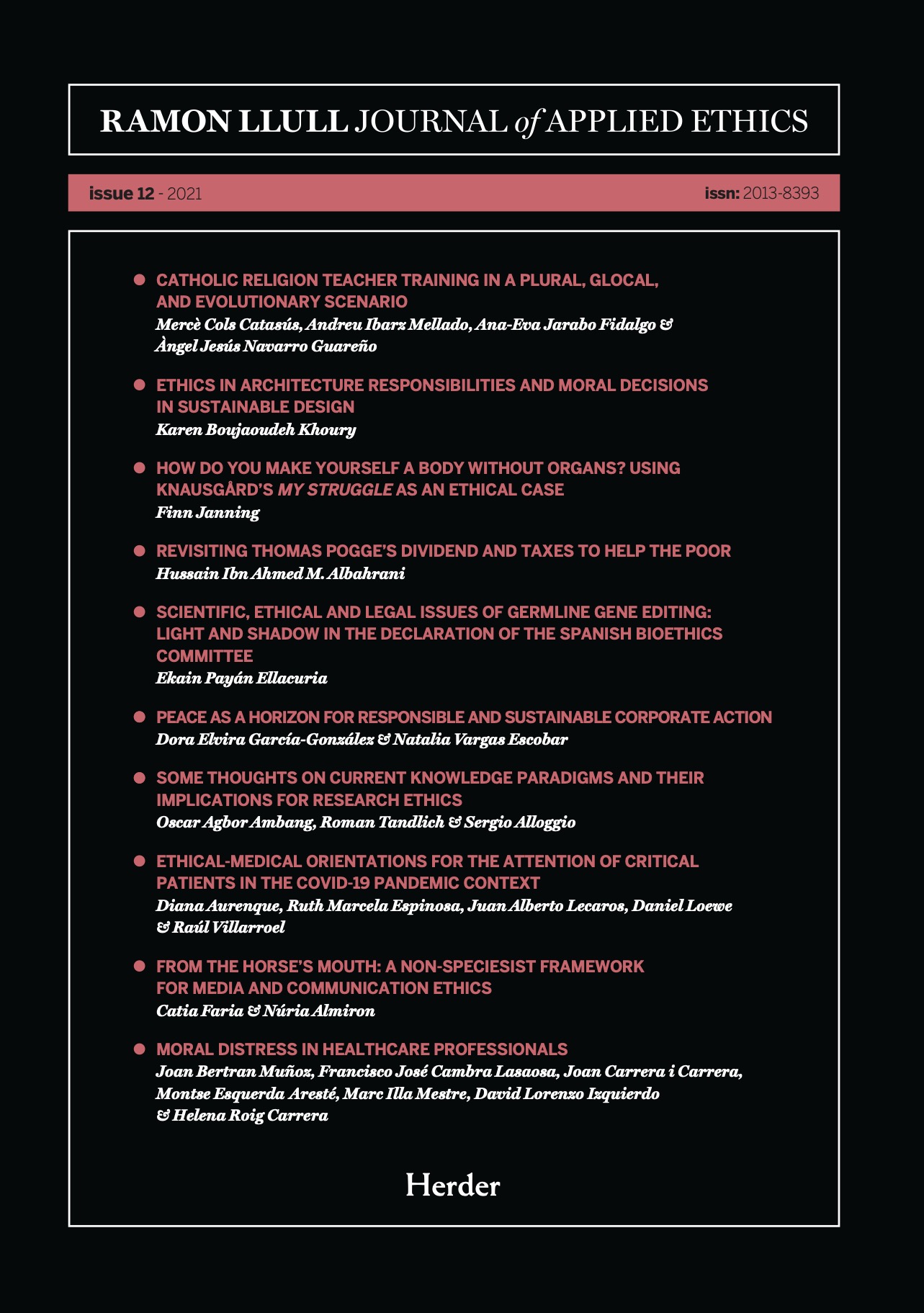How do you make yourself a body without organs? Using Knausgard’s «My struggle» as an ethical case
Article Sidebar

Main Article Content
Abstract: The concept of “the body without organs” takes up a great part of the oeuvre of Deleuze and Guattari. Yet, it is difficult to answer their question—“How do you make yourself a body without organs?”—or to understand their answer. In this paper, I propose that the body without organs is an ethical concept. To support this assertion, I relate, especially, Deleuze’s thought on the Norwegian author Karl Ove Knausgård’s auto-fictive project, My Struggle, suggesting that My Struggle can be read as a body without organs. By doing so, I aim at two things: first, to illustrate a possible application of Deleuze’s ethic, and, second, to show how such an ethic may guide us regarding what we ought to do.
Article Details
(c) Ramon Llull Journal of Applied Ethics, 2021
Braidotti, R. (2011). Nomadic Theory. The Portable Rosi Braidotti. Coumbia University Press.
Butler, J. (2005). Giving an Account of Oneself. Fordham University Press.
Butler, J. (2009). Frames of War: When is Life Grievable. Verso.
Colebrook, C. (2000). “Is Sexual Difference a Problem?” In Ian Buchanan and Claire Colebrook (eds.) Deleuze and Feminist Theory. Edinburgh University Press.
Deleuze, G. (1994). Difference and Repetition. Translated by P. Patton. Columbia University Press.
Deleuze, G. (1995). Negotiations. Translated by M. Joughin. Columbia University Press.
Deleuze, G. (2002). Nietzsche and philosophy. Translated by H. Tomlinson. Continuum.
Deleuze, G. (2000). Cinema 2. The Time-Image, p. 172. Translated by H. Tomlinson and R. Galeta. The Athlone Press
Deleuze, D. (2006). Two regimes of madness. Edited by D. Lapoujade. Translated by A. Hodges and M. Taormina. Semiotexte.
Deleuze, G. & Guattari, F. (1994). What Is Philosophy? , Translated by H. Tomlinson and G. Burchell, Columbia University Press.
Deleuze, G. & Guattari, F. (2000a). A Thousand Plateaus. Translated by B. Massumi. University of Minnesota Press.
Deleuze, G. & Guattari, F. (2000b). Anti-Oedipus. Translated by R. Hurley, M. Seem and H.R. Lane, The Athlone Press.
Janning, F (2015). "Doing Business with Deleuze?." Kritike: An Online Journal of Philosophy, 9 (1): 28-44.
Knausgård, K.O. (2011). Min kamp 1. Lindhardt of Ringhoff Forlag.
Knausgård, K.O (2012). Min kamp 2. Lindhardt of Ringhoff Forlag.
Knaugård, K.O. (2013). Min kamp 5. Lindhardt og Ringhoff Forlag.
Knausgård, K.O. & Woods, J. (2014). “Writing My Struggle: An Exchange.” The Paris Review, Issue 2011, Winter 2014.
Moore, G.E. (1903). Principia Ethica. Cambridge University Press.
Murphy, J. (2016). “Artaud’s Scream”. Deleuze Studies, Volume 10, Number 2, Deleuze and Athleticism, edited by Sarah Mann-O’Donnell. Edinburgh University Press.
O’Hagan, A. (2014). Karl Ove Knausgaard talking to Andrew O’Hagan. London Review via https://www.youtube.com/watch?v=R7ucylZJTWs.
Shaw, J.K. (2016). “Athleticism Is Not Joy: Extricating Artaud from Deleuze’s Spinoza”. Deleuze Studies, Volume 10, Number 2, Deleuze and Athleticism, edited by Sarah Mann-O’Donnell. Edinburgh University Press.
Smith, D. W. (2012). Essays on Deleuze. Edinburgh University Press.
Waal, F. (2009). Primates and Philosophers. How Morality Evolved. Princeton University Press